Hysterectomy can strike fear in the heart of women who may need one. Until a few years ago, doctors thought that leaving one or both healthy ovaries behind during a hysterectomy ensured that you did not experience the harmful effects of sudden menopause (surgical menopause).
But newer studies have shown that hysterectomy can affect your brain function and increase your risk for dementia later, even if your ovaries are left behind.
(00:00) – How to Boost Your Brain in Menopause!
(01:04) – What is a Hysterectomy?
(01:42) – Types of Hysterectomy and Surgeries
(04:31) – Choosing a Hysterectomy
(09:57) – One of the reasons why you might have a Hysterectomy
(11:46) – Talking about Menopause and women less than 51 years
(12:26) – Have you had a Hysterectomy for Endometriosis
(15:37) – Endometriosis and cancer risk
(19:27) – Hysterectomy in non-cancerous states
(20:12) – Non-cancerous fibroids
(23:08) – What happens to the brain in the Menopause?
(28:12) – Symptoms of Menopause in Women
(30:39) – How to Have a Better Brain Post Hysterectomy?
(34:41) – Don’t give progesterone to women after Hysterectomy
(38:42) – Hormone issues, diet and sleep
(40:25) – Hormone therapy and its risks
(40:58) – Hysterectomy and Post-Hystèrectomy
Chapters created by ChapterMe
Gill, Shubhroz, and Satchidananda Panda. “A smartphone app reveals erratic diurnal eating patterns in humans that can be modulated for health benefits.” Cell metabolism 22.5 (2015): 789-798.

In this episode, we explore the impact of the gut microbiome on brain health. We discuss how gut bacteria influence blood pressure, blood glucose...

If you think you have to be training for a marathon or working out for hours each day just to be fit and have...

Food is many things: it can be nutritious fuel for your body and brain, a delicious treat for your taste buds, or even the...